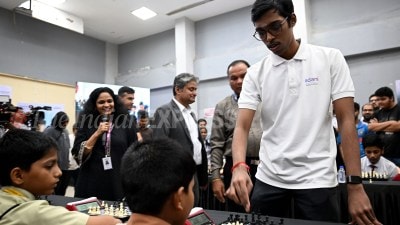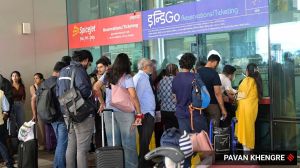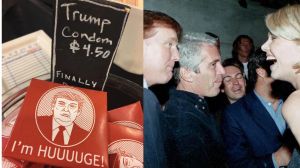Stay updated with the latest - Click here to follow us on Instagram
Hong Kong pro-democracy movement — going from strength to strength
An extradition bill has recently sparked mass protests in Hong Kong. The bill has been stalled, but the citizens want it scrapped and Chief Executive Lam ousted. DW looks at the pro-democracy movement's major milestones.
 A protester, surrounded by riot police officers, lies on the ground during a clash in the Shung Wan area of Hong Kong on Sunday, July 28, 2019. (Lam Yik Fei/The New York Times)
A protester, surrounded by riot police officers, lies on the ground during a clash in the Shung Wan area of Hong Kong on Sunday, July 28, 2019. (Lam Yik Fei/The New York Times)
From Umbrella protests to massive demos against an extradition bill — here are the pro-democracy movement’s milestones.
July 2019
Mass protests continue to take place in Hong Kong despite the government shelving the proposed extradition legislation, which would have allowed people to be sent to places, including mainland China, for trial.
The demonstrations have now evolved into a broader backlash against the city’s administration and its political masters in Beijing. Hong Kongers were outraged by attacks on pro-democracy protesters by suspected pro-government gangs.
Demonstrations also took place at Hong Kong’s international airport, where hundreds of protesters gathered to “educate” tourists on the protests. Some airline workers declared support for the demonstrations.
The unrest has become a major headache for the territory’s leadership.
June 2019
The Hong Kong government concluded that the suspension of a controversial extradition bill would calm the hundreds of thousands of protesters. It didn’t. At least 2 million people took to the streets on June 16, demanding Chief Executive Carrie Lam to step down.
Protesters say the extradition law is part of a campaign by Beijing to undermine the semi-autonomous region’s democratic institutions.
Experts say the simmering anger against Beijing’s increasing interference in Hong Kong’s affairs sparked the latest protests.
April 28, 2019
In one of the biggest demonstrations since 2014, thousands of people took to the streets against proposed extradition rules that would allow people to be sent to mainland China for trial.
In February, Hong Kong authorities proposed that the city’s chief executive, Lam, be given powers to send fugitives and suspects to jurisdictions not covered by existing arrangements, including to mainland China and Taiwan. Current arrangements exclude China because of its poor legal and human rights record.
Hong Kong authorities came under immense pressure from the international community to ditch the extradition bill. The foreign ministers of Germany and the UK spoke against the bill, while 11 European Union envoys met Chief Executive Lam to formally protest the law.
April 9, 2019
A Hong Kong court found the top leaders of the Umbrella Movement guilty of conspiracy to commit public nuisance and incitement for their roles in the 2014 pro-democracy demonstrations.
The 2014 protests, which were spearheaded by three of the defendants in the trial, called for free elections for Hong Kong’s leader.
In 2013, former pastor Chu Yiu-ming, law professor Benny Tai and sociology professor Chan Kin-man founded the pro-democracy “Occupy Central” movement, which later joined with the student-led Umbrella Movement.
September 2018
Hong Kong authorities banned the Hong Kong National Party (HKNP) that campaigned for the territory’s independence. The government said the relatively small party posed a threat to national security.
It was the first time that Hong Kong banned a political party since it was returned to China from the UK in 1997.
November 2016
A Hong Kong court disqualified two pro-independence lawmakers after they used anti-China insults when being sworn into office.
Separatist legislators Sixtus “Baggio” Leung, aged 30, and Yau Wai-ching, 25, sparked controversy during their swearing-in ceremony in October 2016 when they deliberately misread their oaths, substituted derogatory terms for “China” and draped themselves in flags emblazoned with “Hong Kong is not China.”
The decision to disqualify lawmakers was preempted by Beijing’s ruling earlier in November 2016, after it circumvented Hong Kong’s courts to hand down its own interpretation of the Basic Law. Beijing ruled that Hong Kong legislators must swear allegiance to the region as part of China.
January 2016
Thousands of protesters marched through the center of Hong Kong, demanding to know the whereabouts of five missing people linked to a publisher that had been critical of the Beijing leadership. Five people went missing between December 2015 and January 2016. The publisher was known for releasing gossipy titles about Chinese political scandals and the private lives of the elite.
“No to political kidnap!” demonstrators chanted, brandishing banners featuring the words “Where are they?” as they headed toward Beijing’s liaison office in Hong Kong.
Read more: China confirms presence of second Hong Kong publisher
September 2014
Starting in September 2014, large-scale protests demanding more autonomy rocked Hong Kong for over two months. Beijing had announced that it would vet candidates for the 2017 election of Hong Kong’s chief executive. The protests were referred to as the Umbrella Revolution, because protesters used umbrellas to fend off pepper spray and tear gas used by police.
Over the course of the protests, mass demonstrations paralyzed Hong Kong’s financial district and highlighted widespread frustration over the shrinking of the city’s civil liberties.
Read more:Hong Kong votes one year after ‘Umbrella Movement’ protests
June 2009
On the 20th anniversary of the Chinese government’s brutal crackdown in Beijing’s Tiananmen Square, Hong Kong residents gathered for a candlelight vigil in Victoria Park. The purpose of the demonstration was to show how different Hong Kong was from China, where the massacre of pro-democracy supporters and students on June 4, 1989, is usually only referred to as the June Fourth Incident.
Read more: Is Hong Kong’s ‘one country, two systems’ status in jeopardy?
July 1, 2003
Hundreds of thousands of protesters took to the streets of Hong Kong in a historic rally against a controversial national security bill.
The demonstration was the biggest in Hong Kong since its return to Chinese rule. Protesters chanted “Power to the people!” and “Down with Tung!” during the march against the anti-subversion bill as they demanded then Hong Kong Chief Executive Tung Chee-hwa to step down.
The government eventually succumbed to the pressure and scrapped the national security proposal.
Read more: Hong Kong activists hold Tiananmen Square vigil on 30th anniversary
- 01
- 02
- 03
- 04
- 05































